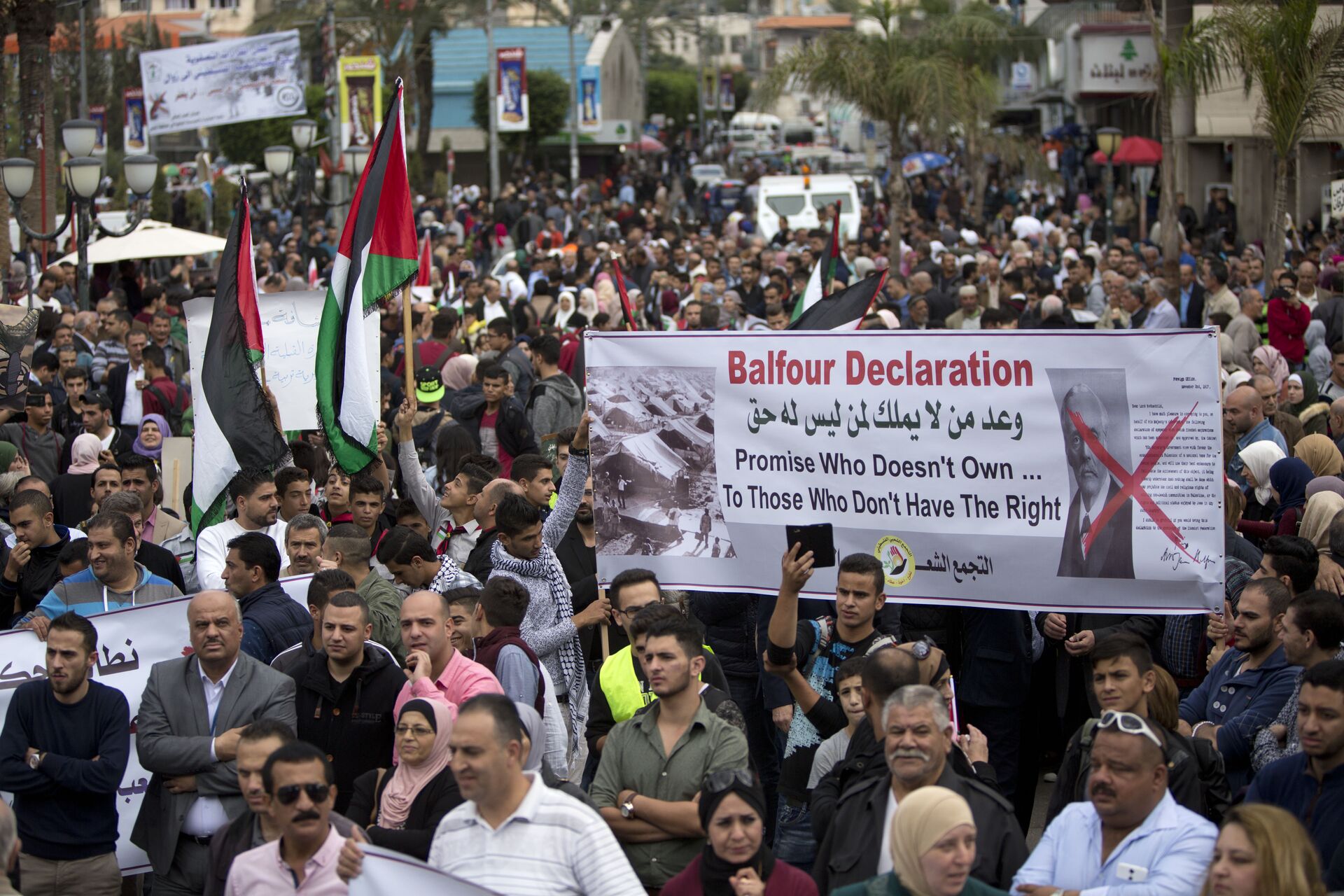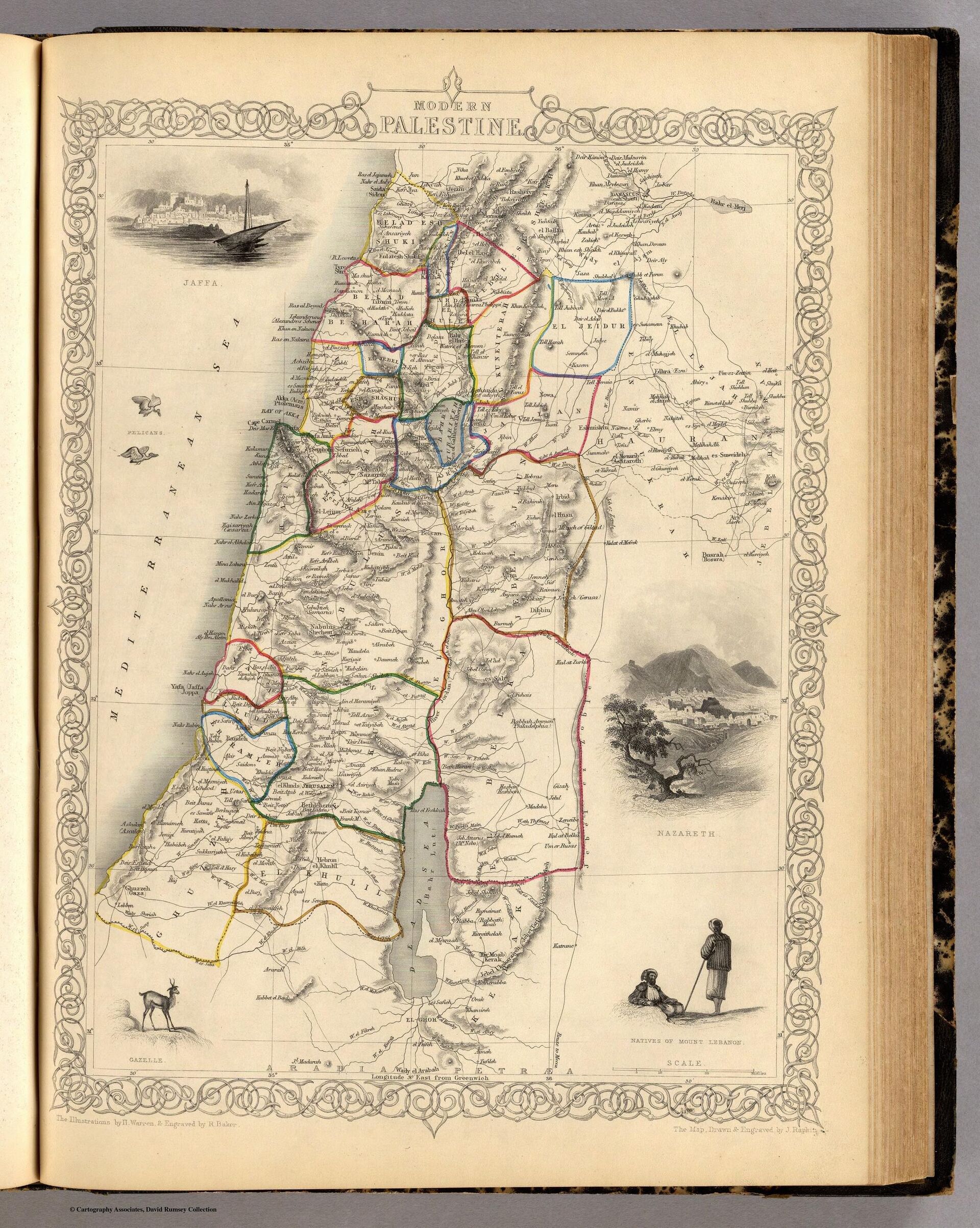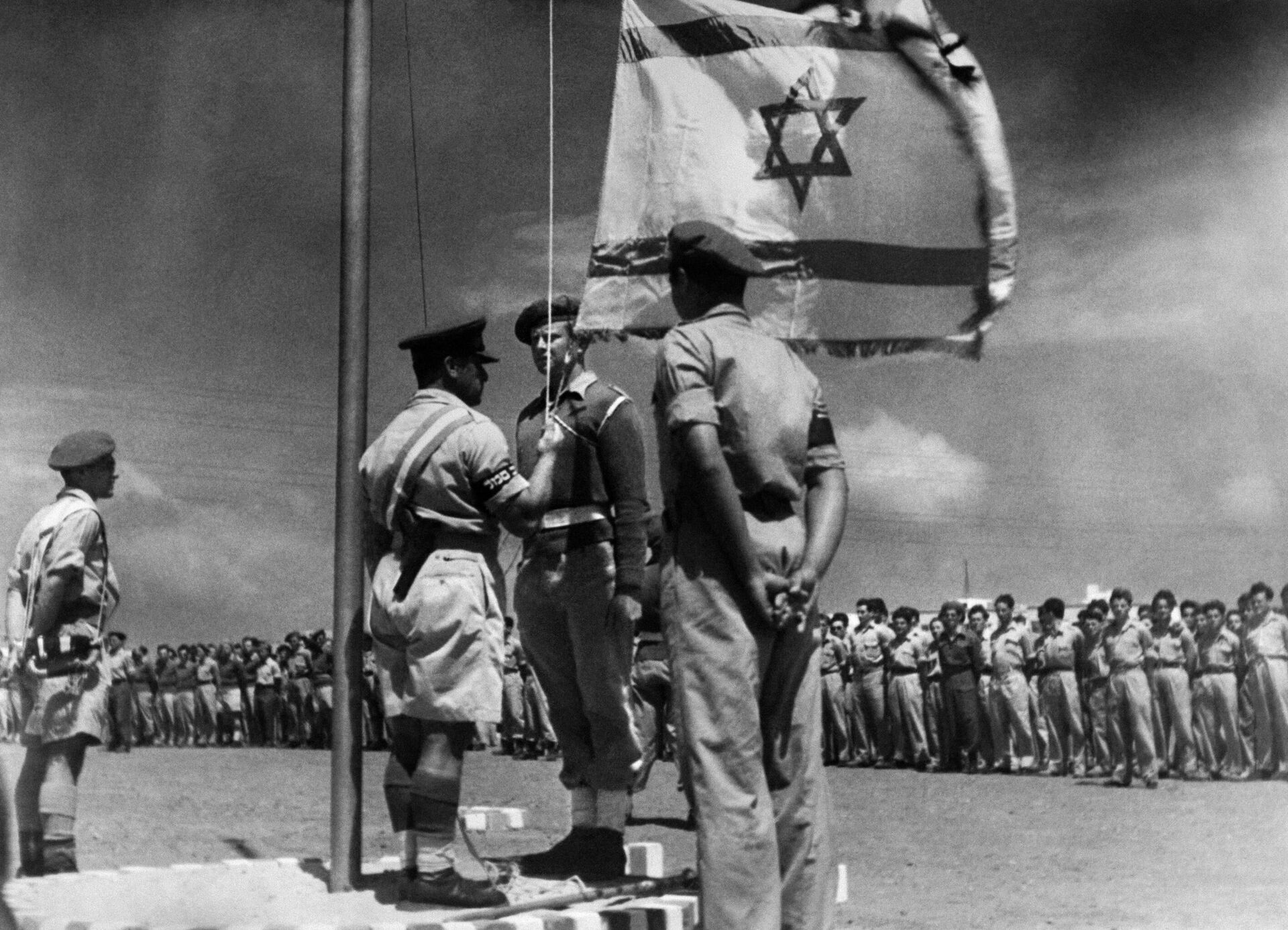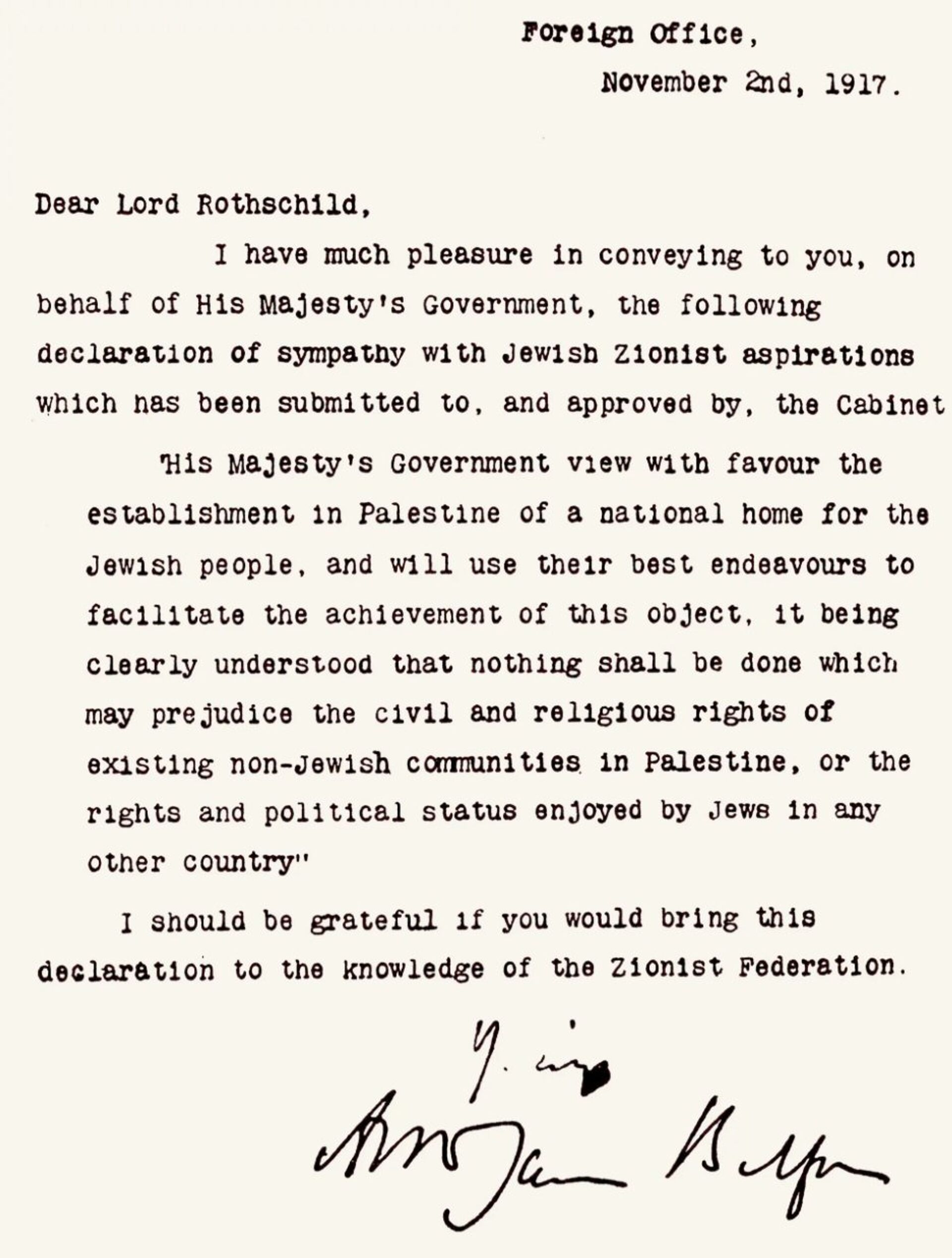https://sputniknews.in/20231027/how-the-balfour-declaration-changed-the-history-of-palestine-5077330.html
How Did Balfour Declaration Change History of Palestine?
How Did Balfour Declaration Change History of Palestine?
Sputnik India
More than a century ago, Britain’s controversial Balfour Declaration altered the course of Palestine's history, here is everything you need to know about it. 27.10.2023, Sputnik India
2023-10-27T13:19+0530
2023-10-27T13:19+0530
2023-10-31T14:01+0530
boris johnson
palestine
israel
united kingdom (uk)
the united nations (un)
israel defense forces (idf)
egypt
league of arab states (las)
colonial rule
colonialism
https://cdn1.img.sputniknews.in/img/07e7/0a/18/5036013_0:114:3072:1842_1920x0_80_0_0_72ea64147a6d508b9950eb40b85136bd.jpg
The Balfour Declaration, a brief and ambiguous letter from British Foreign Secretary Arthur James Balfour to Lord Rothschild, the head of the Zionist Federation, at the height of the First World War, is now frequently cited as evidence of the creation of Israel, Zionist deceptions, Arab injustice, Palestinian suffering, and the duplicity of the West in adjudicating the Arab-Israel conflict.While Zionists considered the Balfour Declaration as an amorphous legal endorsement of a Jewish state, Arabs perceived it as forging a Jewish state from the body of Palestine.What is the Balfour Declaration?The declaration was made in a letter that was sent to Lionel Walter Rothschild, a prominent member of the British Jewish community, by Britain's then-foreign secretary, Arthur James Balfour.After the collapse of the Ottoman Empire, the document was incorporated into the conditions of the British Mandate for Palestine.The arrangement handed authority of the regions formerly ruled by Germany, Austria-Hungary, the Ottoman Empire, and Bulgaria to the winning side of the conflict.The stated purpose of the mandate system was to permit the victorious parties to rule the newly formed states until they could achieve independence.The British started facilitating the immigration of European Jews to Palestine. The Jewish population increased from 9% to over 27% of the total population between 1922 and 1935.The British mandate was designed to offer Jews the ability to establish self-rule at the expense of Palestinian Arabs, despite the caveat in the Balfour Declaration that "nothing shall be done which may prejudice the civil and religious rights of existing non-Jewish communities in Palestine."Colonial Ambition and Palestine Plight The rudimentary issue with the Balfour Declaration, as pointed out by Arthur Koestler is — "one nation solemnly promised to a second nation, the country of a third."While the British denied the indigenous Palestinians the right to self-determination over their territory, they granted the right to national self-determination to the Jewish people, who constitute a minority in Palestine and are foreign nationals overall.The Balfour Declaration might be categorised as a standard colonial document that failed to include the rights of the nation's citizens.British Mandate: Palestine Question to the United Nations and PartitionThe British mandate in Palestine, in contrast to the other post-war mandates, aimed to create the framework for the creation of a Jewish "national home."The League of Nations agreed to the conditions of the British Mandate over Palestine in July 1922, without addressing the indigenous Palestinian population.The British, acknowledging the havoc they had caused, suggested dividing Palestine into Arab and Jewish states.The "White Paper," a policy document that the British government released in May 1939 after re-evaluating its stance, advocated for an autonomous Palestine where Jews and Arabs would share governance rather than splitting Palestine into two states.Unable to handle the subsequent bloody struggle and its "dual obligation," the Mandatory Power referred the Palestine question to the UN, which suggested partitioning Palestine.Israel took over large portions of Jerusalem, which the resolution called for internationalisation, while Jordan and Egypt held the remaining portions of the land.Impact of the Balfour Declaration on PalestineThe Jews had already assembled an army from armed paramilitary groups that the British had trained by the time the British chose to end their mandate in 1947.In contrast, the Palestinians were forbidden from creating institutions or obtaining weapons, which resulted in the 1948 Nakba and the forced eviction of almost 750,000 Palestinians from their country.The British and Jewish soldiers of the 1930s worked closely together, especially the Haganah paramilitary group, the main Zionist militia in Palestine that would eventually play a key role in the Israeli army.Similarly, supporting the "building of a national home for the Jewish people" seems honourable and deserving of celebration—inasmuch as it didn't obscure Western and British imperial aspirations and the horrific reality that would follow under its auspices.
https://sputniknews.in/20231025/india-sends-38-tonnes-of-humanitarian-aid-to-palestine-unsc-ambassador-5061770.html
palestine
israel
united kingdom (uk)
egypt
europe
germany
Sputnik India
feedback.hindi@sputniknews.com
+74956456601
MIA „Rossiya Segodnya“
2023
Swapna Nair
https://cdn1.img.sputniknews.in/img/07e7/09/12/4320104_0:0:681:681_100x100_80_0_0_ca8a7d4d582609272840ffdd1cde7278.jpg
Swapna Nair
https://cdn1.img.sputniknews.in/img/07e7/09/12/4320104_0:0:681:681_100x100_80_0_0_ca8a7d4d582609272840ffdd1cde7278.jpg
News
en_IN
Sputnik India
feedback.hindi@sputniknews.com
+74956456601
MIA „Rossiya Segodnya“
Sputnik India
feedback.hindi@sputniknews.com
+74956456601
MIA „Rossiya Segodnya“
Swapna Nair
https://cdn1.img.sputniknews.in/img/07e7/09/12/4320104_0:0:681:681_100x100_80_0_0_ca8a7d4d582609272840ffdd1cde7278.jpg
balfour declaration, british foreign secretary, arthur james balfour, lord rothschild, zionist federation, first world war, israel, zionist deceptions, arab injustice, palestinian suffering, and the duplicity of the west in adjudicating the arab-israel conflict, jewish state, arab, british prime minister boris johnson, british government, lionel walter rothschild, ottoman empire, british mandate, germany, austria-hungary, the ottoman empire, and bulgaria, european jews, palestine, ‘der judenstaadt, league of nations, "white paper, un, jordan, egypt, "divide and rule", kashmir, myanmar, 1948 nakba, world war ii, western, british imperial
balfour declaration, british foreign secretary, arthur james balfour, lord rothschild, zionist federation, first world war, israel, zionist deceptions, arab injustice, palestinian suffering, and the duplicity of the west in adjudicating the arab-israel conflict, jewish state, arab, british prime minister boris johnson, british government, lionel walter rothschild, ottoman empire, british mandate, germany, austria-hungary, the ottoman empire, and bulgaria, european jews, palestine, ‘der judenstaadt, league of nations, "white paper, un, jordan, egypt, "divide and rule", kashmir, myanmar, 1948 nakba, world war ii, western, british imperial
How Did Balfour Declaration Change History of Palestine?
13:19 27.10.2023 (Updated: 14:01 31.10.2023) More than a century ago, Britain’s controversial Balfour Declaration altered the course of Palestine's history, here is everything you need to know about it.
The Balfour Declaration, a brief and ambiguous letter from British Foreign Secretary Arthur James Balfour to Lord Rothschild, the head of the Zionist Federation, at the height of the First World War, is now frequently cited as evidence of the creation of Israel, Zionist deceptions, Arab injustice, Palestinian suffering, and the duplicity of the West in adjudicating the Arab-Israel conflict.
While Zionists considered the Balfour Declaration as an amorphous legal endorsement of a Jewish state, Arabs perceived it as forging a Jewish state from the body of Palestine.
The Balfour Declaration is a contested document since its dispersion, described in dramatic terms by Former British Prime Minister Boris Johnson, as “tragicomically incoherent”
What is the Balfour Declaration?
The Balfour Declaration was a public statement by the British Government in 1917 during the First World War (1914-1918) declaring its support for a “national home for Jewish people” in Palestine.
The declaration was made in a letter that was sent to Lionel Walter Rothschild, a prominent member of the British Jewish community, by Britain's then-foreign secretary, Arthur James Balfour.
After the
collapse of the Ottoman Empire, the document was incorporated into the conditions of the British Mandate for Palestine.
The Allied powers' so-called mandate system was essentially an umbrella for colonialism and subjugation.
The arrangement
handed authority of the regions formerly ruled by Germany, Austria-Hungary, the Ottoman Empire, and Bulgaria to the winning side of the conflict.
The stated purpose of the mandate system was to permit the victorious parties to rule the newly formed states until they could achieve independence.
Palestine, however, presented a special situation. The British Mandate there, unlike the other post-war mandates, had as its primary objective the construction of a Jewish "national home" in a country where Jews at the time made up fewer than 10% of the population.
The British started facilitating the immigration of European Jews to Palestine. The Jewish population increased from 9% to over 27% of the total population between 1922 and 1935.
The British mandate was designed to offer Jews the ability to establish self-rule at the expense of Palestinian Arabs, despite the caveat in the Balfour Declaration that "nothing shall be done which may prejudice the civil and religious rights of existing non-Jewish communities in Palestine."
Meanwhile, the Founder of Political Zionism, Theodor Herzl, stated in his 1896 publication ‘Der Judenstaadt' that the movement wanted to establish a Jewish state in Palestine, which would entail Jewish sovereignty and control over immigration into the nation.
Colonial Ambition and Palestine Plight
The rudimentary issue with the Balfour Declaration, as pointed out by Arthur Koestler is — "
one nation solemnly promised to a second nation, the country of a third."
With regard to the indigenous Palestinian population, which made up more than 90% of Palestine's population at the time it was under Ottoman administration and was promised by the British to a Jewish population of less than 10%, only fatally restricted guarantees were incorporated.
While the British denied the indigenous Palestinians the right to self-determination over their territory, they granted the right to national self-determination to the Jewish people, who constitute a minority in Palestine and are foreign nationals overall.
The Balfour Declaration might be categorised as a standard colonial document that failed to include
the rights of the nation's citizens.
At the time of the Balfour Declaration’s drafting, Britain was in dire need of support as they were losing the Second World War and reckoned that assisting Zionist endeavours would gain them the favour of the Jewish people.
British Mandate: Palestine Question to the United Nations and Partition
The British mandate in Palestine, in contrast to the other post-war mandates, aimed to create the framework for the creation of a Jewish "national home."
The League of Nations agreed to the conditions of the British Mandate over Palestine in July 1922, without addressing the indigenous Palestinian population.
The British, acknowledging the havoc they had caused, suggested
dividing Palestine into Arab and Jewish states.
The Palestinian people fiercely opposed it demanding independence and a halt to Jewish immigration, it was a full-fledged nationalist insurrection against British control which mounted a three-year uprising from 1936 to 1939.
The "White Paper," a policy document that the British government released in May 1939 after re-evaluating its stance, advocated for an autonomous Palestine where
Jews and Arabs would share governance rather than splitting Palestine into two states.
Unable to handle the subsequent bloody struggle and its "dual obligation," the
Mandatory Power referred the Palestine question to the UN, which suggested partitioning Palestine.
Even though the UN did not formally implement the partition plan, the State of Israel was created and rapidly extended its territorial control beyond the boundaries outlined in the partition resolution, capturing 77 per cent of Palestine’s territory during the 1948 war.
Israel took over large portions of Jerusalem, which the resolution called for internationalisation, while Jordan and Egypt held the remaining portions of the land.
Impact of the Balfour Declaration on Palestine
More than a century old- the Balfour Declaration is a striking reminder of Britain's colonial past, which includes its use of "divide and rule" strategies and the brutal repression of any dissent to its authority. These gruesome practices are not only an inheritance to Palestine but also to Kashmir and Myanmar.
The Jews had already assembled an army from
armed paramilitary groups that the British had trained by the time the British chose to end their mandate in 1947.
In addition, the British had permitted the Jews to create autonomous organisations like the Jewish Agency, which opened the door for the establishment of states— paving the way for the 1948 ethnic cleansing of Palestine.
In contrast, the Palestinians were forbidden from creating institutions or obtaining weapons, which resulted in the 1948 Nakba and the forced eviction of almost 750,000 Palestinians from their country.
In addition, the Israeli occupation found fertile ground under the British Mandate. The British used collective punishment and retaliation, such as night squads, punitive house demolitions, and administrative incarceration, to crush the Palestinian nationalist movement that opposed British rule and supported massive Jewish immigration.
The British and Jewish soldiers of the 1930s worked closely together, especially the Haganah paramilitary group, the main
Zionist militia in Palestine that would eventually play a key role in the Israeli army.
In hindsight, the Balfour Declaration might have helped Europeans reconcile with the horrifying extermination of six million Jews in their continent during World War II.
Similarly, supporting the "building of a national home for the Jewish people" seems honourable and deserving of celebration—inasmuch as it didn't obscure
Western and British imperial aspirations and the horrific reality that would follow under its auspices.







